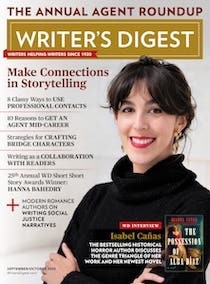5 Things to Stop Doing (If You Really Want to Finish Writing Your Novel)
Your novel isn’t going to write itself (I mean, if it were, it probably would have finished itself a long time ago!). Here are the five things you need to stop doing immediately if you want turn yourself into someone who stops asking questions about how to write a manuscript and starts bragging to friends about how you completed your manuscript.
Your novel isn't going to write itself (I mean, if it were, it probably would have finished itself a long time ago!). Here are the five things you need to stop doing immediately if you want turn yourself into someone who stops asking questions about how to write a manuscript and starts bragging to friends about how you completed your manuscript.
1. Nix the excuses.
We get it, life is busy and writing is hard work sometimes. Still, excuses never changed anything, never inspired anybody, and never made any dreams a reality. Goals like writing a novel don’t die on their own. We suffocate them with our excuses.
2. Stop trying.
Your novel needs less “trying” and more “doing” from you. Like Yoda said, Do or do not. There is no try.
3. Stop the Inner Critic’s crazy rants.
Shut it down. Duct tape its mouth. Stand on its neck. Whatever you do, don’t let the Inner Critic make you doubt yourself. There’s no reason to. This is open range and there are no rules, no right and wrong. You can do Whatever. You. Want.
4. Don’t overdose on caffeine.
Seriously. I’m sorry, but it has to be said. Call it tough love if you want, but more writers go stark raving mad in espresso-fueled rages than any other artists (with the exception of polka musicians, for obvious reasons).
Trust me on this. You don’t want your neighbors finding you crawling through their pet door at 3am in search of more coffee because you ran out at your house two hours earlier. Not that that’s happened to me. I’ve just heard stories.
5. Stop thinking it should be easier.
That’s like hoping gravity will get less gravity … er … ish. Less gravity like. OK, poor choice of words. You know what I mean. Bottom line: writing is what it is. Sometimes it’s easier than at other times. Expect it to be work and you’ll be thrilled when it doesn’t feel that way.
This guest post is by Kevin Kaiser, who has helped authors and publishers reach over 20 million fans worldwide. His online community, 1KTrueFans, helps writers find their voice, build an audience from scratch and create for a living.
Follow him @1KTrueFans.
Follow me on Twitter: @BrianKlems
Enjoy funny parenting blogs? Then you’ll love: The Life Of Dad
Sign up for my free weekly eNewsletter: WD Newsletter
Brian A. Klems is the former Senior Online Editor of Writer’s Digest, and author of Oh Boy, You’re Having a Girl (Adams Media/Simon & Schuster). Follow him on Twitter @BrianKlems.



